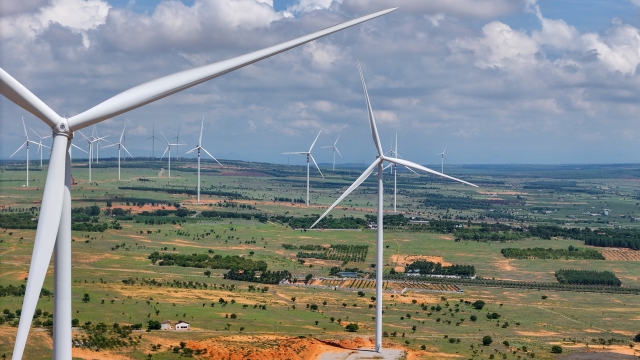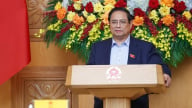Leader Talk
EVFTA and two options for Vietnam
The EU - Vietnam Free Trade Agreement (EVFTA) endows Vietnam with comparative advantages no other country in the region excepting Singapore has.

The most recent Business Climate Index (BCI) data of European Chamber of Commerce in Vietnam (EuroCham) shows that 900 European businesses were positive about Vietnam’s business environment in 2017.
Especially, among EuroCham’s members, 50 - 60 per cent said that they expect to invest more in Vietnam; 36 per cent would remain their investment and only five per cent of them said that they would invest less in Vietnam.
Gellert Horvath, Co-chairman of Eurocham said that this expresses the positive assessments of EU enterprises about the efforts of Vietnamese government in improving the investment and business environment in the passing years and the expectation for the coming time, especially in the legal framework, helping the two sides in the ratification of the EU - Vietnam Free Trade Agreement (EVFTA).
EVFTA is expected to be ratified in the final quarter of this year
When EVFTA, a new-generation free trade agreement (FTA) between EU and Vietnam, is approved, it would become one of the most ambitious and comprehensive investment agreements that have been signed between the European Union (EU) and developing countries.
According to Gellert Horvath, FTAs have proven to be a key driver of economic reform and the most effective instruments to boost trade and investment.
He said that in the past 3 years, EuroCham has been actively involved in promoting the advantages of the EVFTA in Vietnam and in Europe.

Until now, current and prospective EU companies that are or want to operate in Vietnam remain highly optimistic despite some surprising regulatory hindrances to trade, such as Decree 116, implemented by the Government in 2016 and 2017.
“European companies are aware of the potential of Vietnam as a trade and investment destination and as a base towards the ASEAN Economic Community,” said EuroCham leader.
He revealed that the EVFTA, preliminarily signed in 2015, is still officially in what is called the “legal scrubbing” phase, announced to be in its very final stages in December 2017.
The EVFTA was subject to an analysis by the European Court of Justice which stipulated that, because of some of its clauses, ratification had to be carried out in a more innovative way. This opinion prompted the European Commission to choose between two methods when presenting the final version of the agreement for approval to the Member States, Council of the European Union and the European Parliament (EP):
(1) a mixed agreement including all sections as per the initial text (therefore requiring the review and signature of all member states after approval from the EP);
(2) transferring the parts of the FTA on portfolio investment and an investor-state dispute settlement mechanism to a separate agreement, for ratification by the EU and all the Member States.
Deputy director of EuroCham Joaquim Torrinha says that no individual Member State has so far voiced any objections to the EVFTA. If the second option is chosen, there is a higher probability that the agreement can indeed be ratified sometime in the final quarter of this year.
Vietnam must change to make the most of EVFTA
Experts said that the EVFTA will bring enormous benefits to the investment and trade environment between the EU and Vietnam. Accordingly, Vietnam’s GDP is expected to increase by 0.5 per cent each year, and exports are predicted to rise between four per cent to six per cent annually.
If this trend continues until 2020, Vietnam’s exports to the EU will rise by US$2.6 billion, and until 2025, it is estimated that the EVFTA will generate an additional seven per cent to eight per cent of GDP above the current trend growth rate.
EuroCham’s Co-chairman affirmed that the EVFTA endows Vietnam with comparative advantages no other country in the region has, excepting Singapore. The EVFTA gives EU companies more favorable conditions to trade and invest in Vietnam.
“EuroCham strongly believes that the ratification of the EVFTA and its coming into force will have a high impact on the amount of European investment coming to Vietnam,” said EuroCham’s representative.
However, the slow implementation of mechanisms to enforce adopted rules and commitments is a must for Vietnam to be able to enter the global market and make the most of its high potential, even beyond the EVFTA.
The European Union single market is ruled by the highest standards of production, sustainability, transparency and accountability. Vietnam has only to gain as it becomes a global trading force by adapting to the EU single market rules and makes efforts to implement changes as quickly as possible.
“Only with change will we be able to make the most of this momentum and give European investors the opportunity to better contribute to the advancement of Vietnam,” said EuroCham’s leader.
Last October, the European Commission (EC) issued a "yellow card" warning to Vietnam, after the country failed to demonstrate sufficient progress in the fight against illegal, unreported and unregulated (IUU) fishing worldwide. This has been seen as an action that may affect the ratification of EVFTA.
Co-chairman of EuroCham Nicolas Audier affirmed that the ratification of the EVFTA as a whole will be put in question due to this yellow card. However, he said that European institutions and Member States are monitoring Vietnam’s efforts in modernizing its legal framework and enforcement thereof.
EuroCham’s leader said that EuroCham has always advocated for Vietnam’s sustainable development, and its future competitiveness will undoubtedly be linked to Vietnam’s capacity to promote and achieve innovative economic development.
However, substantial internal changes are needed especially as regards infrastructure, administrative reform and legal recourse. For example, Vietnam lags well behind Malaysia and Thailand in terms of Ease of Doing Business. Vietnam did well to jump five places to 55th (out of 137 countries) according to the latest World Economic Forum (WEF) Global Competitiveness Report (Sep. 2017) but is still ranked well behind regional competitors.
The Co-chairman said that Vietnam is not performing less well than any other country at a similar stage of development, but its potential is much greater. If Vietnam can make real progress during 2018 to reduce legal uncertainty and make at least some key internal changes to boost confidence in national and international investors, it will be taking crucial steps towards realizing its potential as one of the most successful trade and investment destinations in the world.
“We are certain that in 2018 we will see faster and more determined action by the Government to boost Vietnam’s competitiveness and economic growth,” EuroCham’s leader expressed.
Vietnam may cope with many obstacles when joining EVFTA
When organic becomes an inspiring wellbeing lifestyle
For Tyna Huynh, co-founder of Drinkizz, organic is not just a food choice but a way of life that fosters a deep connection between people, nature and community.
Garment factories embracing respectful workplaces
Embracing respectful workplaces could very well be the key to unlocking a more prosperous future for Vietnam's garment industry.
Vietnamese corporates in new era: The reborn dragon
Vietnamese businesses have had a long journey with great achievements, and this path will continue and blossom in years to come.
The future of jobs in AI era
While some jobs are expected to be replaced by emerging AI applications, the technology is broadly seen as a catalyst for positive transformation in the workforce.
Financing Southeast Asia’s energy transition
The energy transition is bringing forth new challenges, particularly in refining financial systems.
Few countries are better placed than Vietnam for consistent robust growth
Alex Hambly talks about investment opportunities in Vietnam following his appointment as chief investment officer (CIO) of VinaCapital.










































